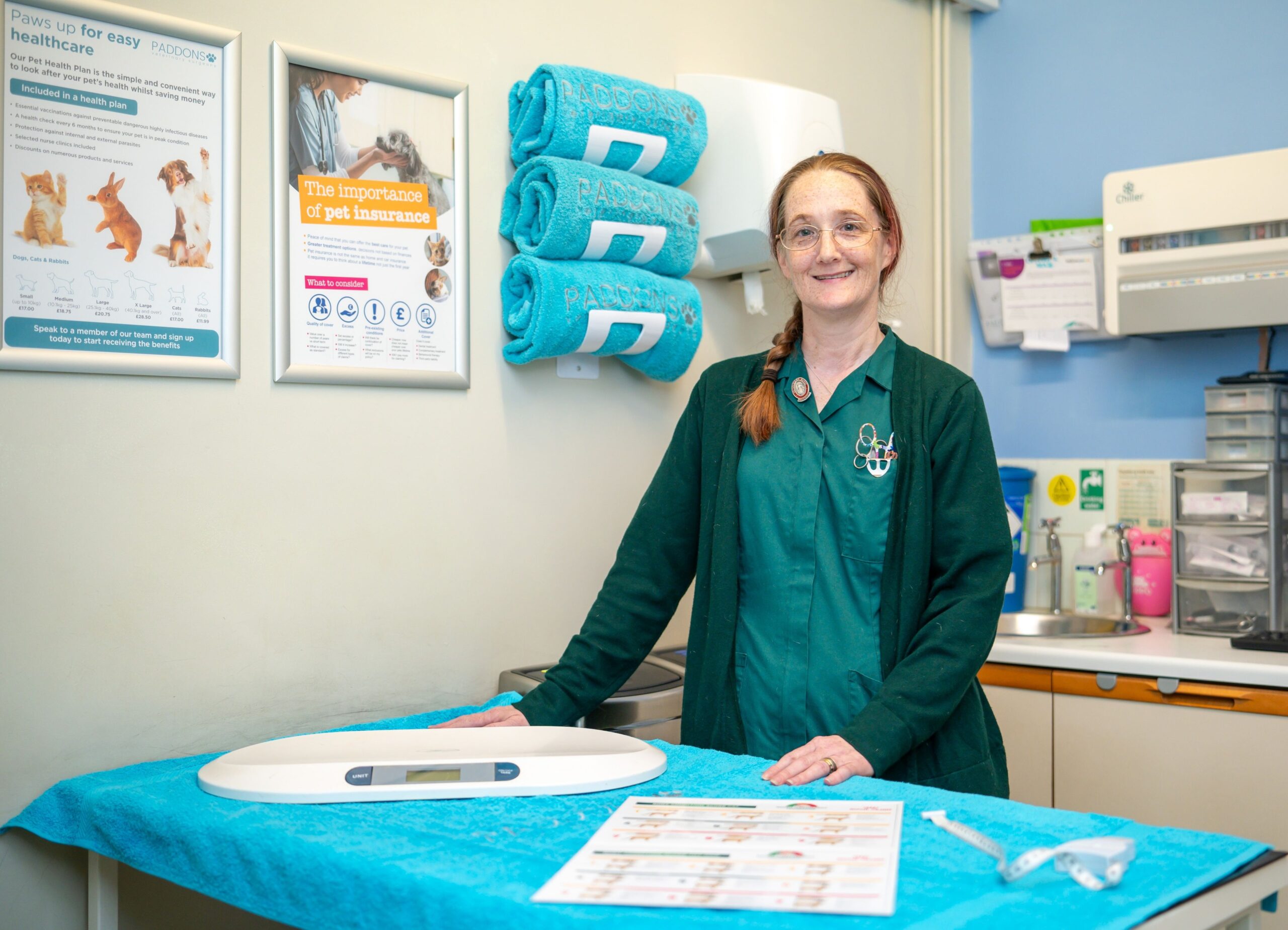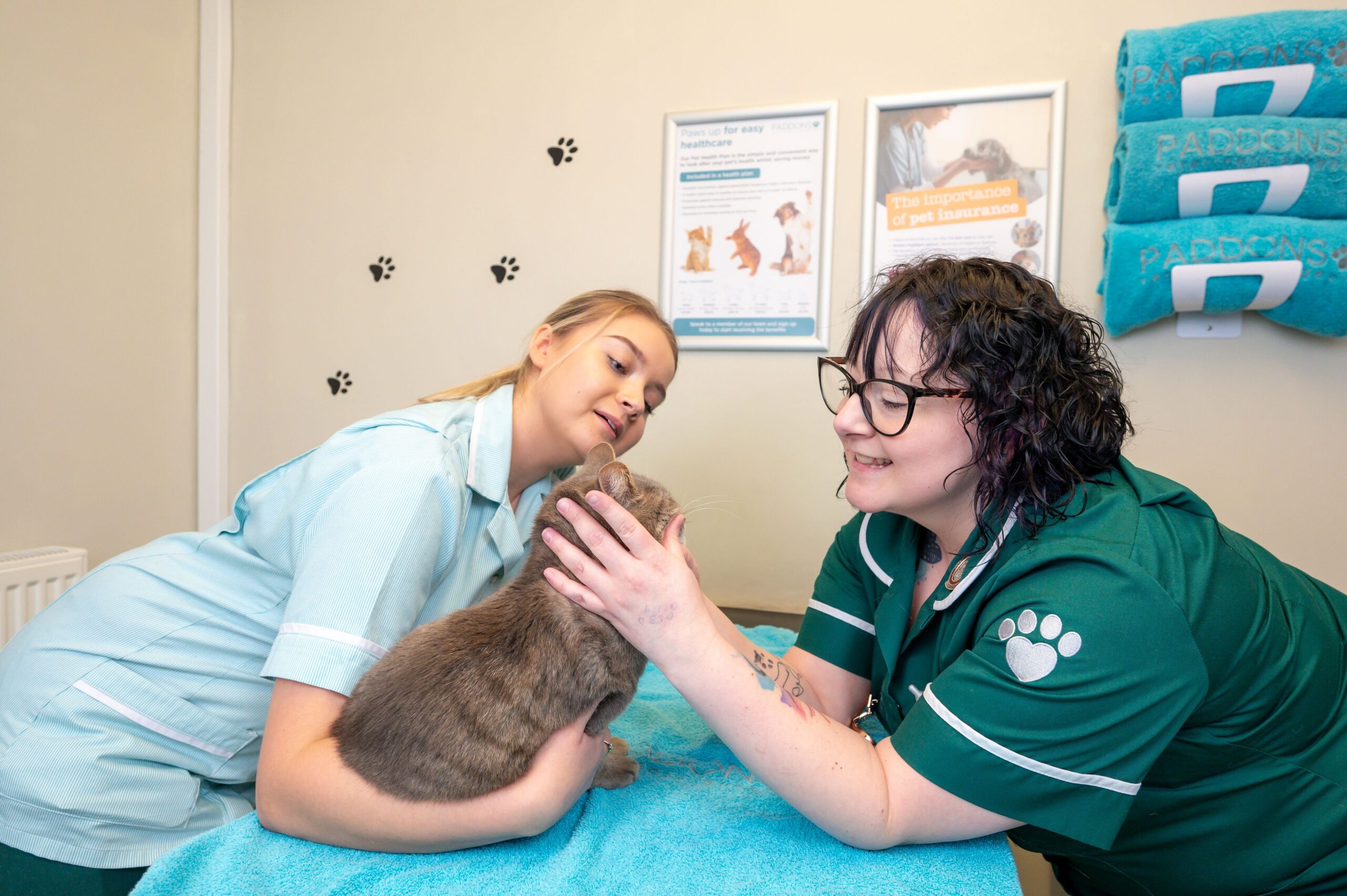Nurse Clinics
WEIGHT CLINICS FOR PETS
Free weight and dental clinics are run by our qualified nurses by appointment. Obesity is a common problem facing a large percentage of the pet population. Obesity can predispose to a number of health problems such as arthritis and diabetes to name a few.
Our qualified nurses can provide advice to help your pet achieve its ideal body weight and can advise on the use of prescription weight loss diets where suitable. Contact us to find out more about nurse clinics and book your pet in for a weight clinic.
PUPPY AND KITTEN CLINICS
Puppy and kitten clinics are run by our nurses to help you with the first few months of your pet’s life. Our nurses are also able to assist you administering worming and flea treatments as well as with nail clipping for a small fee.
PET DENTAL CARE
Dental disease affects a large proportion of the adult canine and feline population and can be painful. Dental home care is an important part of keeping your pet’s teeth healthy and our nurses can talk you through how to do this.
PREPARING TO WELCOME A NEW PUPPY INTO YOUR HOME
It is a very exciting time getting a new puppy but there are a few things to think about before you buy
Choose your breed
Once you have decided on which breed is for you research and research again. Will this breed fit into your lifestyle? Is it the right size for your house? Are they a breed that are good with children? If you work, can they be left on their own for several hours. Can you spend the next 12 to 15 years looking after it?
When you have decided what you want, find a good reputable breeder. The kennel club have a list and, so do all of the many breed clubs. Don’t be afraid to ask for advice.
Now you have decided which breed will be best for your family and found a good breeder the next step is wait until your pup has been born. Don’t be impatient if you have to wait it will be worth it.
The visit
Most breeders will let you visit once the pup is around 4 weeks of age. Always make sure you see the pups with their mum. Do not see the pups in the back of the car or anywhere other than the puppies/breeder’s home
Ask lots of questions about worming regime, diet, what health checks have been carried out on the parents, will they come with 4 weeks free insurance and remember it is the law that the breeder microchips your pup before it leaves their premises. It is also law that a puppy cannot leave its mother until it is 8 weeks old.
Is there a contract between you and the breeder? Some breeders of pedigree dogs put endorsements on the Kennel Club registration papers. These are normally not to be exported and not to be bred from. Make sure your breeder explains these to you
Don’t be afraid to walk away if you are not sure if the puppy is the right one for you. Make sure the litter is confident, happy and playful.
Don’t buy the puppy because you feel sorry for it if it is not being cared for properly. Ring the RSPCA and tell them your concerns. It is better that this breeder is shut down and doesn’t breed again than take the pup allowing them to carry on and making lots of money.
Does your puppy come with a lifetime backup and help from your breeder?
If your breeder is vaccinating your puppy make sure your new vets have a compatible vaccine otherwise you may have to start the course again.
It is always wise to ensure your puppy as you never know when a big vet bill will occur. Most breeders will give you four or five weeks free insurance.
Paperwork
If your puppy is a pedigree, it should be registered with the Kennel Club. If it isn’t, ask the breeder why? There will be a registration form which the owner will sign so you can then put the dog in your name. Some breeders even give you a 5-generation pedigree.
Diet
Most puppies at 8 weeks of age will be on 4 meals a day. Ask if the breeder is giving you some food. Your puppy will have been weaned on this food and so a gradual change of over a week should follow if you decide to change it.
Worming information.
You should be told what your puppy has been wormed with and how often. A good breeder will usually worm at 2, 4 and 8 weeks.
Health Certificates
Ask to see copies of health certificates of the dam and sire. If you are buying a pedigree dog look on the Kennel Club website to see what tests your breed is recommended.
Microchips
By law your puppy should be microchipped before it leaves the breeder’s home. They should give you some documentation to enable you to put your new puppy into your name. Failure to do so can result in a £500 fine. Please update your details as soon as you can.
Introducing to animals in the home
Always introduce your new puppy to your animals very slowly. Your older animals may be jealous of the puppy or not want to know it. Take your time and always supervise them all. If you have a cat, make sure it has an escape route or able to get on high away from the pup for e.g., a windowsill. A scratched eye can be very detrimental to your pup.
Puppy training
That 8kgs puppy can very quickly turn into a 50kgs monster. REMEMBER what you put into an eight-week-old pup will stay with it forever. Find a puppy socialising class, these early days are very important enabling them to work things out.
Training classes after vaccinations are also good. Good behaviour with other dogs is a must.
Most of all, enjoy your new bundle of fun! You will have years of fun together.
WEIGHT CLINICS FOR PETS
Free weight and dental clinics are run by our qualified nurses by appointment. Obesity is a common problem facing a large percentage of the pet population. Obesity can predispose to a number of health problems such as arthritis and diabetes to name a few.
Our qualified nurses can provide advice to help your pet achieve its ideal body weight and can advise on the use of prescription weight loss diets where suitable. Contact us to find out more about nurse clinics and book your pet in for a weight clinic.
PUPPY AND KITTEN CLINICS
Puppy and kitten clinics are run by our nurses to help you with the first few months of your pet’s life. Our nurses are also able to assist you administering worming and flea treatments as well as with nail clipping for a small fee.
PET DENTAL CARE
Dental disease affects a large proportion of the adult canine and feline population and can be painful. Dental home care is an important part of keeping your pet’s teeth healthy and our nurses can talk you through how to do this.
PREPARING TO WELCOME A NEW PUPPY INTO YOUR HOME
It is a very exciting time getting a new puppy but there are a few things to think about before you buy
Choose your breed
Once you have decided on which breed is for you research and research again. Will this breed fit into your lifestyle? Is it the right size for your house? Are they a breed that are good with children? If you work, can they be left on their own for several hours. Can you spend the next 12 to 15 years looking after it?
When you have decided what you want, find a good reputable breeder. The kennel club have a list and, so do all of the many breed clubs. Don’t be afraid to ask for advice.
Now you have decided which breed will be best for your family and found a good breeder the next step is wait until your pup has been born. Don’t be impatient if you have to wait it will be worth it.
The visit
Most breeders will let you visit once the pup is around 4 weeks of age. Always make sure you see the pups with their mum. Do not see the pups in the back of the car or anywhere other than the puppies/breeder’s home
Ask lots of questions about worming regime, diet, what health checks have been carried out on the parents, will they come with 4 weeks free insurance and remember it is the law that the breeder microchips your pup before it leaves their premises. It is also law that a puppy cannot leave its mother until it is 8 weeks old.
Is there a contract between you and the breeder? Some breeders of pedigree dogs put endorsements on the Kennel Club registration papers. These are normally not to be exported and not to be bred from. Make sure your breeder explains these to you
Don’t be afraid to walk away if you are not sure if the puppy is the right one for you. Make sure the litter is confident, happy and playful.
Don’t buy the puppy because you feel sorry for it if it is not being cared for properly. Ring the RSPCA and tell them your concerns. It is better that this breeder is shut down and doesn’t breed again than take the pup allowing them to carry on and making lots of money.
Does your puppy come with a lifetime backup and help from your breeder?
If your breeder is vaccinating your puppy make sure your new vets have a compatible vaccine otherwise you may have to start the course again.
It is always wise to ensure your puppy as you never know when a big vet bill will occur. Most breeders will give you four or five weeks free insurance.
Paperwork
If your puppy is a pedigree, it should be registered with the Kennel Club. If it isn’t, ask the breeder why? There will be a registration form which the owner will sign so you can then put the dog in your name. Some breeders even give you a 5-generation pedigree.
Diet
Most puppies at 8 weeks of age will be on 4 meals a day. Ask if the breeder is giving you some food. Your puppy will have been weaned on this food and so a gradual change of over a week should follow if you decide to change it.
Worming information.
You should be told what your puppy has been wormed with and how often. A good breeder will usually worm at 2, 4 and 8 weeks.
Health Certificates
Ask to see copies of health certificates of the dam and sire. If you are buying a pedigree dog look on the Kennel Club website to see what tests your breed is recommended.
Microchips
By law your puppy should be microchipped before it leaves the breeder’s home. They should give you some documentation to enable you to put your new puppy into your name. Failure to do so can result in a £500 fine. Please update your details as soon as you can.
Introducing to animals in the home
Always introduce your new puppy to your animals very slowly. Your older animals may be jealous of the puppy or not want to know it. Take your time and always supervise them all. If you have a cat, make sure it has an escape route or able to get on high away from the pup for e.g., a windowsill. A scratched eye can be very detrimental to your pup.
Puppy training
That 8kgs puppy can very quickly turn into a 50kgs monster. REMEMBER what you put into an eight-week-old pup will stay with it forever. Find a puppy socialising class, these early days are very important enabling them to work things out.
Training classes after vaccinations are also good. Good behaviour with other dogs is a must.
Most of all, enjoy your new bundle of fun! You will have years of fun together.



